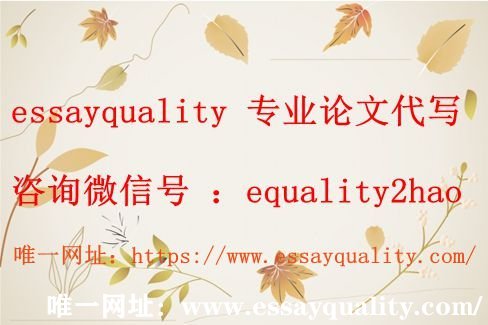EssayQuality唯一网址:https://www.essayquality.com/提供:北美法律作业代写、law网课作业代写代修、北美法律代写、法律论文代写、law格式apa代写、law格式mla代写、网课作业代写、网课托管、essay代写、assignment代写、report代写、paper代写...
Claimant has not asserted a prima facie claim ofexpropriation
原告没有权利去获得研究方面的索赔
Respondent alleges in the Memorial on Jurisdiction thatClaimant has not filed a prima facie claim that qualifies as anexpropriation under Article 4 of the BIT. 原告声称在BIT“第4条规定的征收条款中,在管辖范围内,被告没有提交一份关于权利要求限定的立案。
Respondent argued that thisis a requirement of objective nature and its assessment may requirea definitive interpretation of the corresponding article in the BIT.According to Respondent, the Tribunal has to determine if theviolations alleged by the Claimant meet the requirements of thetreaty and therefore allow the Tribunal to have rationae materiaejurisdiction.
The Respondent also argues that Claimant must prove thatPeru interfered with his investment so that it has substantiallydeprived Claimant from the economic value, use or enjoymentthereof. Respondent added that such interference must be of a sucha magnitude that is tantamount to an effective takeover of property.Respondent believes that SUNAT measures did not bankrupt theinvestment or destroyed or halted the economic viability andbusiness activities of the company. On the contrary, Respondentmaintains that TSG conducted exports after SUNAT's measures andthat in Claimant's application with INDECOPI for a “PreventiveBankruptcy Proceeding” clearly stated TSG maintained its economicviability.http://ukthesis.org/fvxzy/
Claimant's Arguments原告的讨论
Claimant explains in his pleading that he believes the Tribunalshould decide on this matter during the trial of the merits.
原告陈述了他的恳求,他认为法庭应该在这个问题上作出决定,这是在审讯过程中应该做出的决定。
However,Claimant proceeded to provide arguments explaining what hebelieves was the expropriatory impact of SUNAT's measures. Firstof all, Claimant affirms that the production activities of TSG didbecame halted as a result of SUNAT measures. Claimant explainsthat exports completed thereafter were existing inventories tocomply with contract commitments obligations. Secondly, Claimantexplains that TSG representations regarding the economic viabilityof its business are a legal requirements of the PreventiveBankruptcy Proceeding and that in any case they referred to thecompany's capacity of meeting its existing liabilities then.(61)115. Claimant explains that SUNAT tax lien measures were takenarbitrarily based on a purported tax debt whose enforcement hadbeen impugned. Claimant explains that the impact of SUNAT'smeasures consisted in preventing TSG to continue with theirproductive activities.原告解释说的关于防止TSG继续他们的生产活动的SUNAT措施的反响。
Considerations of the Tribunal116. The Tribunal will consider first Respondent's position. In theiropinion, for the Tribunal to exercise jurisdiction, the expropriation claim must –at least prima facie– qualify under the requirementsestablished in Article 4 of the BIT.
Article 4(1) of the BIT establishes as follows:a. Neither Contracting Party shall expropriate, nationalise or takesimilar measures (hereinafter referred to as “expropriation”)against investments of investors of the other Contracting Party inits territory, unless the following conditions are met:(1) for the public interest;(2) under domestic legal procedure;(3) without discrimination;(4) against compensation118. Respondent emphasises that Article is objective legislationand an assessment thereof may require a definitive interpretationthereof. The Tribunal realises that, in this preliminatry stage, neitherthe BIT nor the ICSID Convention and Arbitration Rules require theTribunal to provide a defninitive interpretation of the scope of Article4. On the contrary, Article 41 of the Convention provides as follows:与此相反,“公约”第41条规定如下:
a. The Tribunal shall be the judge of its own competence.b. Any objection by a party to the dispute that that dispute is notwithin the jurisdiction of the Centre, or for other reasons is notwithin the competence of the Tribunal, shall be considered bythe Tribunal which shall determine whether to deal with it as apreliminary question or to join it to the merits of the dispute.119. Similarly, Arbitration Rule 41(4) also provides that the Tribunal“may deal with the objection as a preliminary question or join it to themerits of the dispute.”120. Once this has been established with regard to Respondent'sobjection under Article 4, the Tribunal understands that it is theirduty to abide by the requirements of Article of the ICSID Convention,as it verifies that the claim is a dispute of legal nature that arisesdirectly out of the investment.121. As a matter of fact, according to Article 44 of the ICSIDConvention, the Tribunal may decide on any question of procedurenot covered thereby. The Tribunal is not alien to the approachadopted by numerous tribunals following the opinion maintained byJudge Rosalyn Higgins in her particular vote to the decision of theInternational Court of Justice in the Case Case Oil Platforms dated12 December 1996.122. According to such an opinion, the Tribunal may provisionallyaccept as true the facts as described by Claimant and assesswhether the same would reasonably violate Article 4 of the BIT.Bearing this in mind, and for the purposes of this preliminary stage,the Tribunal believes that prima facie the facts as described byClaimant may, by virtue of its nature, violate Article of the BIT. It remains to be seen if in the stage of the merits, Claimant willproduce sufficient evidence thereof and proves how they effectivelyviolate such provision.以上所说的问题还有待观察,如果在这个阶段,需要以他们自身的情况来判定,并且原告将列出足够的证据证明它们是如何违反这些规定的。



